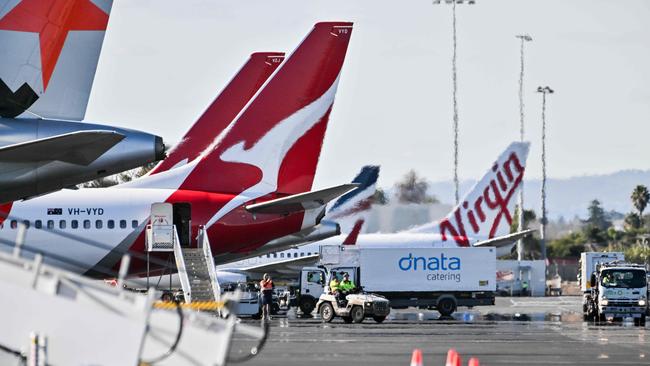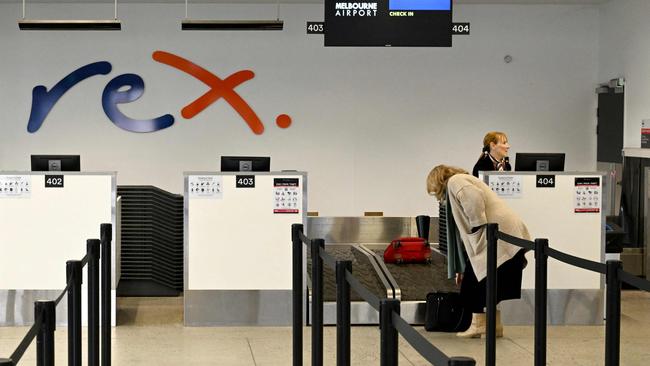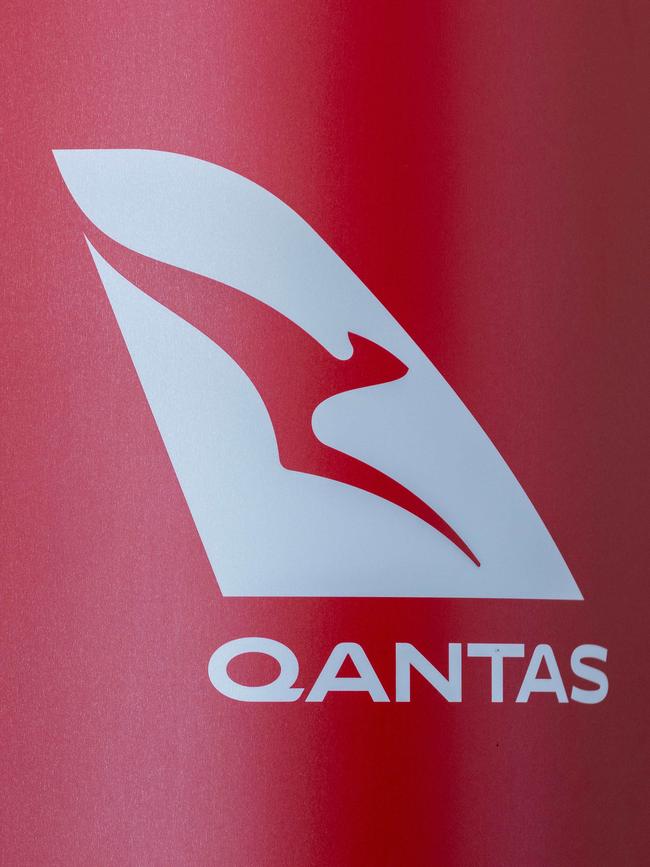Vikki Campion: Qantas-Virgin duopoly has left consumers stranded
What did the taxpayer get for the billions of dollars it handed to Qantas? A duopoly that has blown up Bonza and now wrecked Rex, writes Vikki Campion.
Opinion
Don't miss out on the headlines from Opinion. Followed categories will be added to My News.
Imagine if I was the only one in Australia who could sell cattle. The price would be astronomical and I would have lobbyists all through Canberra telling you how good it was for you to buy this expensive meat and, during drought, you would subsidise me billions of dollars to keep my company going.
I would give politicians all the best cuts to ensure they left me the sole provider of your protein.
I’d put my former but loyal staff into the agriculture minister’s office so they had eyes and ears on all cabinet documents about grazing and, if another farmer wanted to use a paddock, I’d tell the minister that I was already using it, even if I had no plans to put a single steer on pasture; and I’d poach all the musterers so the small competitor would have no talent, just for fun.
Luckily, we have thousands of farmers in small businesses across the country — but we only have two airlines doing 95 per cent of aviation business, aggressively adopting these competition-stifling tactics.
How many times do eminent professors, such as former Australian Competition and Consumer Commission chair Alan Fels have to call out Qantas’s bullying practices — such as restrictive slot allocation at major airports — before a minister listens to him?

Late last year, a senate committee brought on by opposition transport spokeswoman Bridget McKenzie recommended the federal government investigate anti-competitive behaviour in the domestic aviation market.
But if Qantas can get billions from taxpayers for Covid, they can steel off an inquiry by the Senate.
What did the taxpayer get for the billions of dollars it handed to Qantas? A duopoly that has blown up Bonza and now wrecked Rex, the airline that so much of regional Australia relies upon.
Qantas does everything to garner favour with those in authority, such as painting Voice signage over the tail of its aircraft, welcoming you to country every time you go home and throwing millions at the Yes campaign, to show just how enthusiastic it was to back the Prime Minister’s failed divisive race-based referendum.
Even though it has the white kangaroo on its red tail and, for a time the Yes campaign art, it won’t deliver services to Indigenous areas that need them, like Ceduna.
Rex did. Still does, for now.

Ceduna in South Australia, is where, just weeks ago, a report revealed Indigenous babies were starving following the Albanese government’s ripping the cashless debit card away from mothers for their food.
Without a third-party airline like Rex, the Ceduna mother has a nine-hour drive to Adelaide — where each economy ticket to Canberra costs about $690 — to have their say to politicians at the start of the next sitting week.
Unlike Rex, Qantas doesn’t fly into those regional, disadvantaged, Indigenous areas they apparently cared so deeply about during the Voice campaign.
If you want to know how shallow their affection goes for the Indigenous populations, try flying from Alice Springs to Canberra for the next sitting week in mid-August. At the time of writing, a Qantas booking started at $600. One-way.
Or you can fly from Weipa, in Far North Queensland, to Canberra, where the cheapest Qantas fare starts at $1200 because you won’t find a Qantas plane in Bamaga or any other northern Indigenous community.
If they drive some 40 hours to Brisbane and fly from there to Canberra to talk to politicians at the start of the next sitting week, the flight is nearly $300 one-way.
This is their hypocrisy.

When CEOs get multimillion-dollar bonuses, you have all the motivation in the world to grease up politicians to get all the slots you like and behave how you want.
Rex meant regional flights for cancer patients to major hospitals. It meant regional business could advocate for themselves. It’s not just tourism, it’s economic connectivity, health and education.
Meanwhile, in a country that allows a free aviation market, flights from regional cities to the capital in Washington DC cost a fraction of that — about $85 from Philadelphia to DC or $180 from Nashville to DC.
The US would never tolerate just two airlines in its market.
We have a unique disease of hosting and subsidising duopolies that tell us it’s morally appropriate to rip us off.
Rex was forced to bend backwards to get the scraps of slots, most of which were salvaged from an international pool at Sydney Airport.
At the time, Qantas was at 90 per cent pre-Covid capacity and squatted on 110 per cent of the pre-Covid allotment, wasting 20 per cent of the slots and illicitly preventing competition. Qantas claimed it didn’t hoard slots, the same way one small child will tell you he didn’t smack the crying one in the face.
Even the airports told last year’s inquiry that Qantas had pushed smaller airlines out of the market by launching the same flight routes on the same day as smaller carriers did, only to cancel these flight paths once smaller airlines were no longer viable.
If we had let Qantas go broke during Covid, would the Australian consumer today be better off?
Do you have a story for The Daily Telegraph? Message 0481 056 618 or email tips@dailytelegraph.com.au





